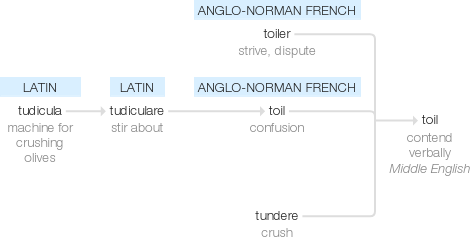Toil
Middle English (in the senses ‘contend verbally’ and ‘strife’): from Anglo-Norman French toiler ‘strive, dispute’, toil ‘confusion’, from Latin tudiculare ‘stir about’, from tudicula ‘machine for crushing olives’, related to tundere ‘crush’.
wiktionary
From Middle English toilen, toylen, apparently a conflation of Anglo-Norman toiller(“to agitate, stir up, entangle”) (compare Old Northern French tooillier, tooullier(“to agitate, stir”); of unknown origin), and Middle English tilyen, telien, teolien, tolen, tolien, tulien(“to till, work, labour”), from Old English tilian, telian, teolian, tiolian(“to exert oneself, toil, work, make, generate, strive after, try, endeavor, procure, obtain, gain, provide, tend, cherish, cultivate, till, plough, trade, traffic, aim at, aspire to, treat, cure”) (compare Middle Dutch tuylen, teulen(“to till, work, labour”)), from Proto-Germanic *tilōną(“to strive, reach for, aim for, hurry”). Cognate with Scots tulyie(“to quarrel, flite, contend”).
An alternate etymology derives Middle English toilen, toylen directly from Middle Dutch tuylen, teulen(“to work, labour, till”), from tuyl("agriculture, labour, toil"; > Modern Dutch tuil(“toil; work”)). Cognate with Old Frisian teula(“to labour, toil”), teule(“labour, work”), Dutch tuil(“toil, labour”). Compare also Dutch telen(“to grow; raise; cultivate, till”). More at till.
etymonline
toil (n.1)
"hard work," c. 1300, originally "turmoil, contention, dispute," from Anglo-French toil (13c.), from toiler "agitate, stir up, entangle, writhe about," from Old French toeillier "drag about, make dirty" (12c.), usually said to be from Latin tudiculare "crush with a small hammer," from tudicula "mill for crushing olives, instrument for crushing," from Latin tudes "hammer," from PIE *tud-, variant of *(s)teu- "to push, stroke, knock, beat" (see obtuse). Sense of "hard work, labor" (1590s) is from the related verb (see toil (v.)).
toil (n.2)
"net, snare," 1520s, from French toile "hunting net, cloth, web" (compare toile d'araignée "cobweb"), from Old French toile "cloth" (11c.), from Latin tela "web, net, warp of a fabric," from PIE root *teks- "to weave," also "to fabricate." Now used largely in plural (as in caught in the toils of the law).
toil (v.)
early 14c., toilen, "pull at, tug," from Anglo-French toiller, Old French toellier "pull or drag about" (see toil (n.1)). Intransitive meaning "struggle, work hard, labor for considerable time" is from late 14c., perhaps by influence of till (v.). Related: Toiled; toiling.
